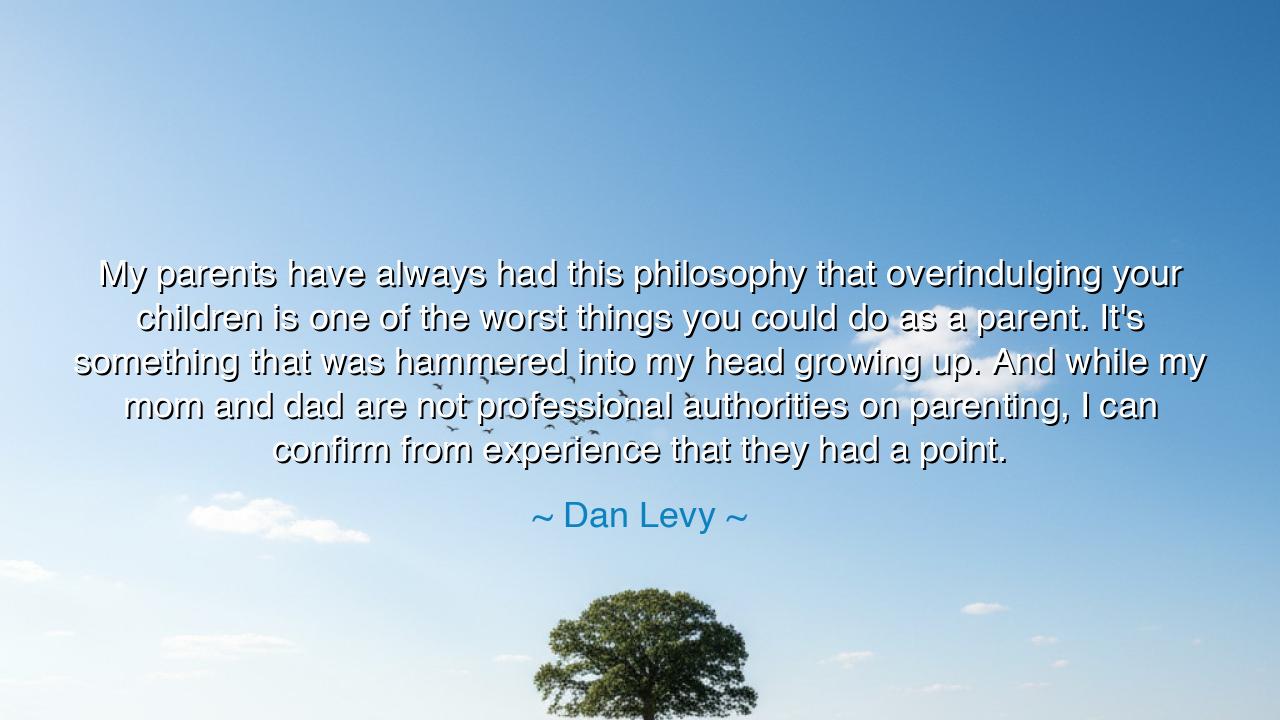
My parents have always had this philosophy that overindulging
My parents have always had this philosophy that overindulging your children is one of the worst things you could do as a parent. It's something that was hammered into my head growing up. And while my mom and dad are not professional authorities on parenting, I can confirm from experience that they had a point.






Hearken, O children of generations yet to be, and attend to the words of Dan Levy, whose voice carries the weight of reflection and lived truth: “My parents have always had this philosophy that overindulging your children is one of the worst things you could do as a parent. It's something that was hammered into my head growing up. And while my mom and dad are not professional authorities on parenting, I can confirm from experience that they had a point.” In these words lies a wisdom as ancient as the first teachers and elders: that restraint, guidance, and measured nurture are essential to shaping character, and that indulgence, though comforting, can erode virtue and resilience.
The origin of this reflection rests in Levy’s upbringing, where his parents instilled lessons of moderation and responsibility. Though not scholars or authorities of pedagogy, they recognized that true growth is forged in the balance between love and discipline, generosity and restraint. By resisting the temptation to indulge, they cultivated in their child the values of patience, perseverance, and appreciation. From this crucible of intentional guidance, Levy learned that the wisdom of the parent often lies not in titles or manuals, but in insightful action and consistent principle.
The meaning of his words is both practical and profound. Overindulgence may gratify in the moment, yet it risks softening the spirit, fostering entitlement, and dulling the resilience that life demands. Levy’s acknowledgment affirms that children flourish when nurtured with care tempered by limits, learning that rewards must be earned, responsibilities acknowledged, and virtues cultivated through effort. In this, parenting becomes an act not of mere provision, but of moral shaping and character cultivation.
Consider the life of Benjamin Franklin, whose father instilled both guidance and expectation, resisting indulgence in favor of fostering independence and industry. Franklin’s childhood demanded diligence, humility, and reflection, and in these early trials, he cultivated the ingenuity, self-discipline, and civic responsibility that would later define him. The wisdom of restraint, like that imparted by Levy’s parents, proved a guiding flame, showing that measured discipline births both competence and character.
Yet Levy’s reflection also carries a subtle recognition: parenting need not be perfect or professional to be wise. The insight of ordinary parents, grounded in experience, observation, and consistent principle, often surpasses theoretical authority. His parents’ philosophy, though simple, was deliberate: to resist indulgence, cultivate resilience, and teach the child that the world demands effort, patience, and respect for limits. Herein lies a lesson older than any book: wisdom is often practical, lived, and proven through experience.
The lesson for future generations is luminous: moderation, discipline, and careful guidance are gifts far greater than indulgence. To provide without limits is to weaken, while to nurture with boundaries fosters strength, independence, and appreciation. Levy’s reflection teaches that the parent’s role is to prepare the child not merely for comfort, but for the rigors, challenges, and opportunities of life, shaping the character and fortitude necessary to thrive.
In practical life, one may follow Levy’s counsel by cultivating restraint, expectation, and intentional guidance. Provide love and support, yet resist the temptation to overindulge. Teach children the value of effort, the satisfaction of earned rewards, and the necessity of facing challenges. Through measured guidance, they learn resilience, gratitude, and the capacity to navigate life’s trials with wisdom and courage.
Thus, O children of future ages, carry this teaching as both lantern and shield: the wisdom of restraint in parenting is a gift that endures beyond comfort or fleeting pleasure. Nurture with balance, guide with principle, and cultivate the strength, virtue, and independence of those entrusted to your care. In this sacred labor lies the shaping of character, the fortification of the spirit, and the enduring legacy of love guided by wisdom across generations.






AAdministratorAdministrator
Welcome, honored guests. Please leave a comment, we will respond soon